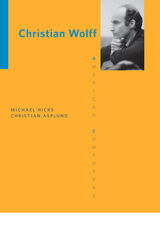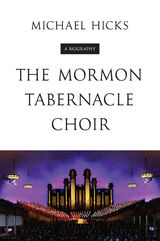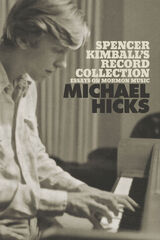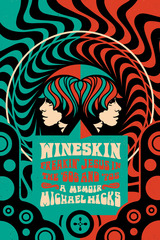5 books about Hicks, Michael

Christian Wolff
Michael Hicks and Christian Asplund
University of Illinois Press, 2012
In this first interpretive narrative of the life and work of Christian Wolff, Michael Hicks and Christian Asplund trace the influences and sensibilities of a contemporary composer's atypical career path and restless imagination. Written in full cooperation with Wolff, including access to his papers, this volume is a much-needed introduction to a leading avant-garde composer still living, writing music, and speaking about his own work.
Wolff has pioneered various compositional and notational idioms, including overtly political music, indeterminacy, graphic scores, and extreme virtuosity. Trained as a classicist rather than a musician, Wolff has never quite had both feet in the rarefied world of contemporary composition. Yet he's considered a "composer's composer," with a mind ensconced equally in ancient Greek tragedy and experimental music and an eccentric and impulsive compositional approach that eludes a fixed stylistic fingerprint.
Hicks and Asplund cover Wolff's family life and formative years, his role as a founder of the New York School of composers, and the context of his life and work as part of the John Cage circle, as well as his departures from it. Critically assessing Wolff's place within the experimental musical field, this volume captures both his eloquence and reticence and provides insights into his broad interests and activities within music and beyond.
[more]

The Mormon Tabernacle Choir
A Biography
Michael Hicks
University of Illinois Press, 2015
A first-of-its-kind history, The Mormon Tabernacle Choir tells the epic story of how an all-volunteer group founded by persecuted religious outcasts grew into a multimedia powerhouse synonymous with the mainstream and with Mormonism itself.
Drawing on decades of work observing and researching the Mormon Tabernacle Choir, Michael Hicks examines the personalities, decisions, and controversies that shaped "America's choir." Here is the miraculous story behind the Tabernacle's world-famous acoustics, the anti-Mormonism that greeted early tours, the clashes with Church leaders over repertoire and presentation, the radio-driven boom in popularity, the competing visions of rival conductors, and the Choir's aspiration to be accepted within classical music even as Mormons sought acceptance within American culture at large. Everything from Billboard hits to TV appearances to White House performances paved the way for Mormonism's crossover triumph. Yet, as Hicks shows, such success raised fundamental concerns regarding the Choir's mission, functions, and image.
Drawing on decades of work observing and researching the Mormon Tabernacle Choir, Michael Hicks examines the personalities, decisions, and controversies that shaped "America's choir." Here is the miraculous story behind the Tabernacle's world-famous acoustics, the anti-Mormonism that greeted early tours, the clashes with Church leaders over repertoire and presentation, the radio-driven boom in popularity, the competing visions of rival conductors, and the Choir's aspiration to be accepted within classical music even as Mormons sought acceptance within American culture at large. Everything from Billboard hits to TV appearances to White House performances paved the way for Mormonism's crossover triumph. Yet, as Hicks shows, such success raised fundamental concerns regarding the Choir's mission, functions, and image.
[more]

Sixties Rock
Garage, Psychedelic, and Other Satisfactions
Michael Hicks
University of Illinois Press, 1999
Unlike their rock 'n' roll predecessors, many rock musicians of the mid-sixties came to consider themselves as artists--self-consciously presenting themselves as creators of a new sonic medium.
Sixties Rock offers a provocative look at these artists and their innovations in two pivotal rock genres: garage rock and psychedelic music. Delving into everything from harmony to hardware, Michael Hicks shows what makes this music tick and what made it unique in its time. Looking at bands like the Doors, the Rolling Stones, the Yardbirds, and Love, Hicks puts legends and flashes in the pan alike through a rigorous analysis that places their music within rock history while exploring its place in the oft-swirling contexts of the time.
Sixties Rock offers a provocative look at these artists and their innovations in two pivotal rock genres: garage rock and psychedelic music. Delving into everything from harmony to hardware, Michael Hicks shows what makes this music tick and what made it unique in its time. Looking at bands like the Doors, the Rolling Stones, the Yardbirds, and Love, Hicks puts legends and flashes in the pan alike through a rigorous analysis that places their music within rock history while exploring its place in the oft-swirling contexts of the time.
[more]

Spencer Kimball's Record Collection
Essays on Mormon Music
Michael Hicks
Signature Books, 2020
At times jubilant, at times elegiac, this set of ten essays by music historian Michael Hicks navigates topics that range from the inner musical life of Joseph Smith to the Mormon love of blackface musicals, from endless wrangling over hymnbooks to the compiling of Mormon folk and exotica albums in the 1960s. It also offers a brief memoir of what happened to LDS Church President Spencer Kimball’s record collection and a lengthy, brooding piece on the elegant strife it takes to write about Mormon musical history in the first place. There are surprises and provocations, of course, alongside judicious sifting of sources and weighing of evidence. The prose is fresh, the research smart, and the result a welcome mixture of the careful and the carefree from Mormonism’s best-known scholar of musical life.
[more]

Wineskin
Freakin’ Jesus in the ‘60s and ‘70s
Michael Hicks
Signature Books, 2022
Mormonism begins with a memoir: Joseph Smith kneeling in a grove until two-thirds of the Godhead appear and promise him a quixotic religious renown. Since then, the faith Smith birthed has raised up memoirs as gritty as Parley P. Pratt’s quasi-canonical Autobiography or as luminously sarcastic as Elna Baker’s New York Regional Mormon Singles Halloween Dance. Grafted somewhere into those works’ genealogy comes this boyhood memoir, rooted not in Mormonism but in the Protestantism of American suburbia and the Jesus Freak movement of the early 1970s, then in, out, and back into the Church of Jesus Christ of Latter-day Saints.
Michael Hicks’s story is a tale studded with awkward episodes of sex, drugs, and rock and roll (not necessarily in that order), along with alcohol, sci-fi, theft, radical politics, cartooning, halfway houses, and the musical avant-garde. The one constant is the brooding figure of Jesus Christ behind Hicks’s various personal reclamations and metamorphoses, often via methods admittedly off the books. While many readers know Hicks as a Mormon academic—thirty-five years a professor of music at Brigham Young University—Wineskin excavates the path, from boyhood to a PhD, that led him toward a faith that is both primitively Christian and highmindedly Mormon.
Michael Hicks’s story is a tale studded with awkward episodes of sex, drugs, and rock and roll (not necessarily in that order), along with alcohol, sci-fi, theft, radical politics, cartooning, halfway houses, and the musical avant-garde. The one constant is the brooding figure of Jesus Christ behind Hicks’s various personal reclamations and metamorphoses, often via methods admittedly off the books. While many readers know Hicks as a Mormon academic—thirty-five years a professor of music at Brigham Young University—Wineskin excavates the path, from boyhood to a PhD, that led him toward a faith that is both primitively Christian and highmindedly Mormon.
[more]
READERS
Browse our collection.
PUBLISHERS
See BiblioVault's publisher services.
STUDENT SERVICES
Files for college accessibility offices.
UChicago Accessibility Resources
home | accessibility | search | about | contact us
BiblioVault ® 2001 - 2024
The University of Chicago Press









